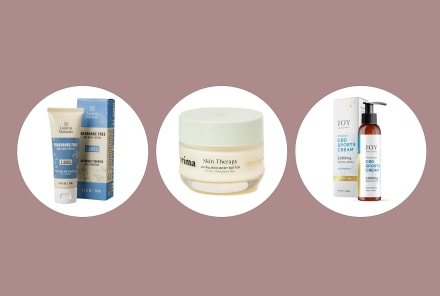Advertisement
Men's Testosterone Levels Are Dropping At An Alarming Rate. Here's What To Do About it


When I say the word "testosterone," you probably think about men's health. It is, after all, the main sex hormone in men, responsible for the changes that occur during puberty and then maintaining those characteristics and attributes throughout their life. And while women do have testosterone in their bodies, it's to a much lesser extent.
Over the past few decades, testosterone levels have been declining in men of all ages. In fact, a study published in JAMA showed that between 2010 and 2013, prescriptions for testosterone therapy were up by more than 50 percent. There are a lot of reasons, like ever-increasing stress levels and the obesity epidemic, for this shift, and it's something we all need to address right away. As it turns out, low testosterone can actually exacerbate symptoms that can cause low testosterone, causing a downward spiral that can affect a man's health in really negative ways. In one example, studies have linked low testosterone1 to elevated levels of anxiety and depression. Symptoms and concerns of low testosterone include low libido, weight gain or inability to lose weight, erectile dysfunction, decreased energy, and increased stress levels.
Fortunately, there are many ways natural medicine and lifestyle changes can be individualized to boost testosterone and improve overall health. The following lifestyle changes boost testosterone in the body by optimizing the health of all organ systems to make and metabolize it as needed:
1. Intermittent fasting
Intermittent fasting is one of the most effective ways to lose weight and restore testosterone levels—and it's usually tolerated better by men than women. IF can also make our cells more sensitive to insulin, another important factor in overall hormone health. Consider starting with a 12- to 15-hour fast every day from dinner to breakfast. This rests our digestive system long enough that we can begin to optimally detox and reset. Emphasis on dark leafy greens and cruciferous vegetables are also incredibly beneficial as they provide a plethora of vitamins and minerals that aid in detoxification, as well as healthy production and metabolism of testosterone.
2. Lifting weights
Weightlifting at least three to four times per week helps raise testosterone and makes our cells more sensitive to insulin (reducing the risk for type 2 diabetes).
3. Cutting these foods out of your diet
Limiting or omitting alcohol, dairy, or grains will also be beneficial as they can disrupt natural hormone balance, raise insulin levels, and increase aromatization, which is the process of converting androgenic hormones like testosterone into estrogens.
4. Getting enough high-quality sleep
Quality sleep is also important, as studies have shown that less than five hours of sleep can decrease testosterone and sperm count after only one week. Aim for sleep around 10:30 to 11 p.m. to optimize the decrease of cortisol—and production of hormones like testosterone and thyroid—that regenerate overnight2.
5. Try these supplements and herbs
There are many natural treatments that have been proved to boost testosterone. One good option is d-aspartic acid, which has been shown to increase LH, which makes testosterone. Vitamin D, a precursor to testosterone, can also help optimize testosterone levels3, especially when ranges are around the typical 40 to 50 ng/mL, as these have also been shown to help with blood sugar issues and improve cardiovascular health, weight loss efforts, and mood issues. Other great nutrients include zinc (needed to make testosterone), and n-acetyl-cysteine (supports both detoxification pathways and overall liver health). Herbs like tribulus and fenugreek have also been shown to raise testosterone levels.
All of these changes can be incorporated as part of a larger plan to balance testosterone levels in the body. I recommend working with a knowledgeable practitioner who can devise a plan around the person in front of them and individualize tests and supplements as needed, not just to boost testosterone but to address additional concerns. In this scenario, we are looking at the whole person, acknowledging the mind-body connection where treatment also doubles as preventive care. 4
Watch Next
Enjoy some of our favorite clips from classes
Enjoy some of our favorite clips from classes
What Is Meditation?
Mindfulness/Spirituality | Light Watkins
Box Breathing
Mindfulness/Spirituality | Gwen Dittmar
What Breathwork Can Address
Mindfulness/Spirituality | Gwen Dittmar
The 8 Limbs of Yoga - What is Asana?
Yoga | Caley Alyssa
Two Standing Postures to Open Up Tight Hips
Yoga | Caley Alyssa
How Plants Can Optimize Athletic Performance
Nutrition | Rich Roll
What to Eat Before a Workout
Nutrition | Rich Roll
How Ayurveda Helps Us Navigate Modern Life
Nutrition | Sahara Rose
Messages About Love & Relationships
Love & Relationships | Esther Perel
Love Languages
Love & Relationships | Esther Perel
What Is Meditation?
Box Breathing
What Breathwork Can Address
The 8 Limbs of Yoga - What is Asana?
Two Standing Postures to Open Up Tight Hips
How Plants Can Optimize Athletic Performance
What to Eat Before a Workout
How Ayurveda Helps Us Navigate Modern Life
Messages About Love & Relationships
Love Languages
Advertisement

8 Dietitians Share The Nutrition Advice They Actually Follow
Molly Knudsen, M.S., RDN

Why Women Are Twice As Likely To Struggle With Depression & Anxiety
Phyllis E. Greenberger, MSW

8 Dietitians Share The Nutrition Advice They Actually Follow
Molly Knudsen, M.S., RDN

Why Women Are Twice As Likely To Struggle With Depression & Anxiety
Phyllis E. Greenberger, MSW













